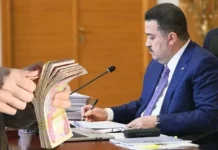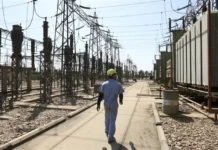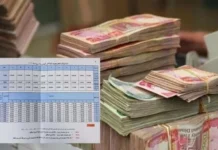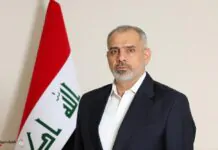Tishwash: The dinar is recovering and the exchange rate is declining towards the official rate.
Samir Al-Nusairi
For several months in 2025, the US dollar exchange rate has continued to decline against the Iraqi dinar, recovering by around 13 points.
It is expected to gradually decline to approach the official exchange rate during the coming period of this year, in accordance with the Central Bank’s strategy and ongoing measures for comprehensive banking reform, regulating foreign trade financing, and transitioning to direct dealings between our banks and correspondent banks, in addition to complying with international banking standards.
Restricting the sale and distribution of cash dollars to a strict mechanism has been praised by the International Monetary Fund and the US Treasury as a successful and advanced method and application for controlling the stability of the US dollar exchange rate and keeping cash dollar sales to a minimum, thus preventing the circulation of the currency from being available for speculation in the parallel market.
To support the dinar’s recovery, “we must look at the rate at which the Central Bank covers all external transactions, including imports and personal transfers.
This explains price stability, given the current inflation rate, which is less than 2.5%, lower than the inflation rates in neighboring countries. This means that the Central Bank has achieved two basic monetary policy objectives: controlling exchange rates and curbing inflation.”
This confirms that the wise monetary policy adopted by the Central Bank has contributed significantly to the stability of the exchange rate and the decline of the parallel market to the lowest possible level.
The Central Bank’s insistence and cooperation with the government during the second half of the current year will lead to a gradual decline in the exchange rate of the US dollar, which has been stable for two days at the thirties and is moving towards the official exchange rate. link
*************
Tishwash: A plan to connect the East and West of the world via Baghdad
The Ministry of Planning clarified, on Monday, that the Belt and Road Initiative launched by China is consistent and complementary to the development road project that Iraq has begun implementing, while pointing to a plan to link the Iran-Iraq railway to the Gulf, Eastern countries and Europe.
Ministry spokesman Abdul Zahra Al-Hindawi told the official agency, followed by Al-Eqtisad News: “The Belt and Road Initiative launched by China in 2013 is based on a network of roads and railways that connect the East to the West via main corridors and axes. Iraq is perhaps one of the main axes, taking into account that there is a railway linking China to Uzbekistan, then Pakistan and then Iran within this initiative.”
He added, “There is an idea to link the Iran-Iraq, Turkey, and Syria railway line with the Gulf, Eastern countries, and Europe,” noting that “this idea is consistent with and complements the development road project that Iraq has begun implementing.”
He explained that, “Under this vision, Iraq is considered an important global transportation hub, both on railways and by road, in addition to the services provided by the railway network, as well as those related to transporting passengers in record times, transporting goods and merchandise, and commercial shipping. This is important for Asian countries, the Levant, and trade with the West, as it saves a lot of time and costs, given that the roads are shortened by passing through Iraqi territory.” link
************
Tishwash: The US has stopped sending cash dollars to Iraq. Is this the beginning of a blockade?
Private sources confirmed that the United States has decided to completely halt cash dollar shipments to Iraq, a move described as potentially the beginning of a “financial blockade” on some Iraqi banks involved in currency smuggling and money laundering.
According to a source who spoke to Al-Mustaqilla on condition of anonymity, Washington’s decision does not pertain to Iraq as a country, but rather targets specific banks suspected of involvement in suspicious dollar transfers to countries subject to international sanctions. This has angered the US Treasury, prompting it to tighten controls on dollar movement within the Iraqi market.
Sudden drop in exchange rate after the decision
Remarkably, the US decision coincided with a significant decline in the dollar exchange rate in the Iraqi market. Experts interpreted this as a natural consequence of the restrictions on the circulation of cash and the prevention of its smuggling abroad. This led to an increase in supply in the local market and a temporary decline in its price.
Government shift towards “legal dollarization”
Separately, a banking source revealed that the Iraqi government has been relying on new mechanisms for disbursing salaries and conducting financial transactions for months. These mechanisms involve legal invoices processed through official banks and digital platforms linked to the global financial system. This is an alternative to the paper dollar shipments previously transported into the country by air.
The source indicated that this step represents a major shift in cash liquidity management in Iraq , making it difficult for suspicious entities to continue smuggling or manipulating the currency market.
Is this the beginning of the storm?
The US decision raises many questions about the future of dollar transactions in Iraq, especially in light of escalating regional tensions and Washington’s tightening of financial sanctions. Are we witnessing the beginning of a new phase of international restrictions on the Iraqi economy? Or is this merely a technical measure against some violating banks? link





